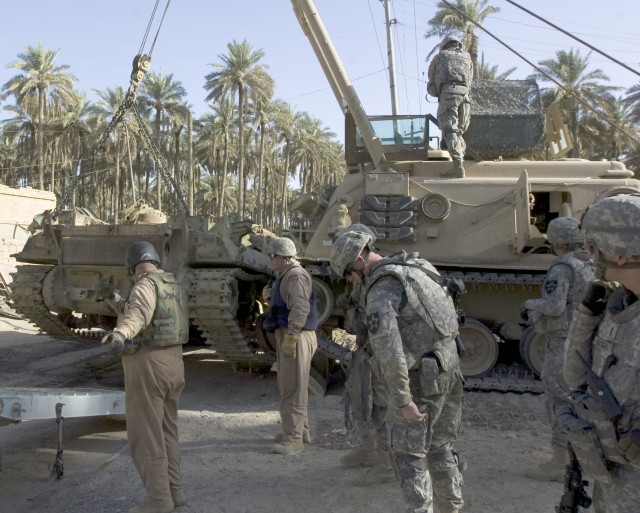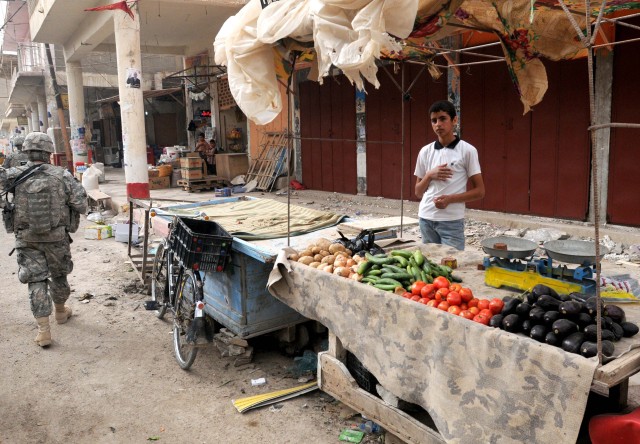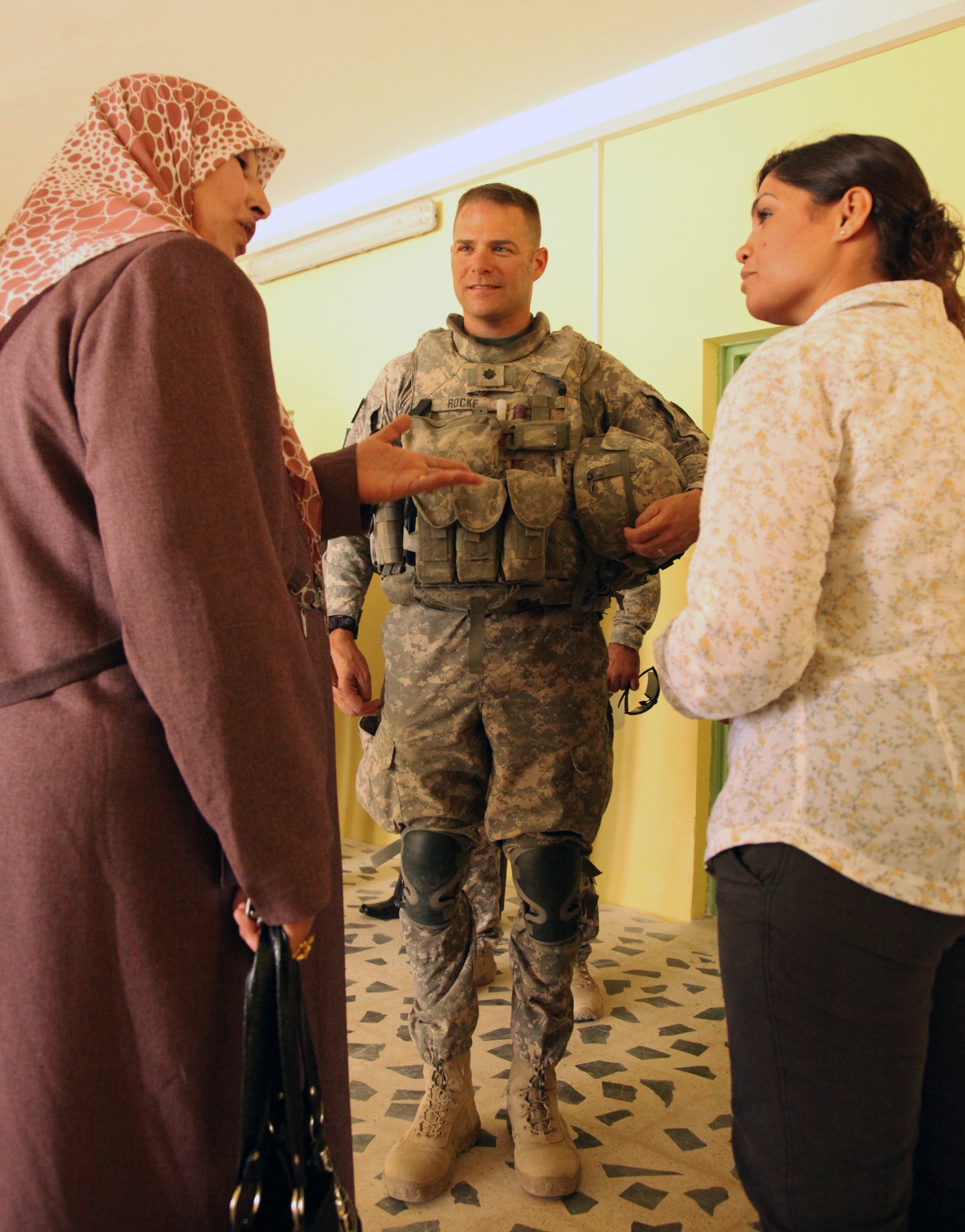JOINT BASE LEWIS-MCCHORD, Wash. - There is far more to the infantry mission in Iraq these days than closing with and destroying the enemy.
The first 3rd Brigade, 2nd Infantry Division Soldiers who returned last month from Iraq - 2nd Battalion, 3rd Infantry Regiment - spent the tour expanding their resumes beyond standard warrior tasks. They performed the typical raids, security patrols and cordon-and-search missions from the time they arrived in Muqdadiyah in mid-2009. But for every full-spectrum combat operation, the battalion helped reconstruct Iraqi society - from building a classroom to reviving a marketplace and even reincarnating a local bank.
"We changed (missions) as the conditions on the battlefield changed," said Lt. Col. Adam Rocke, commander of 2-3 Inf. "We set a direction of continuing full-spectrum operations, but built the overall stability of the qada (a district roughly equal to a county). We got much more into project development, reconstruction, infrastructure development, and that became an integral part of our targeting process - lethal and nonlethal targeting."
A sister unit in the brigade, 5th Battalion, 20th Infantry Regiment, did some of the heaviest lifting of the war in 2007 in Diyala Province, rooting out deeply entrenched al-Qaida fighters from Baqubah, 27 miles southwest of Muqdadiyah, the self-proclaimed capital in Iraq of their brutal, Fascist-brand of Islam. It was dangerous work, nose-to-nose, neighborhood-to-neighborhood combat operations that set the foundation for building trust between the Iraqis and their American liberators. Later, 4th Brigade, 2nd Infantry Division moved into Muqdadiyah.
It seemed fitting that another 3rd Bde., 2nd Inf. Div. battalion help transition the society back to normalcy.
The Patriots' stability and reconstruction efforts during the past year were as important as their combat missions were to resuming peaceful lives in Diyala and mending the province's social fabric.
Combat and reconstruction
Rocke and his battalion arrived in Diyala Province a year ago during a period of transition in Muqdadiyah, a city of about 200,000 people, as their center of gravity. The mission evolved and changed four times, requiring a combination of counterinsurgency and reconstruction operations.
Suspecting the variety of missions mirrored the changing social landscape, Rocke task organized his Headquarters Company away from scouts and heavy weapons and into a more traditional Stryker infantry mode.
"I needed more people on the ground to deal with the population, to deal with the leaders," Rocke said. "I needed that company commander, his platoon leaders and sergeants to help augment my force."
The hybrid requirement was no surprise. Colonel David Funk, 3rd Bde., 2nd Inf. Div. commander, had anticipated the transition toward reconstruction and directed his subordinate commanders to prepare for it.
"We had trained for this. We had thought about this almost three years ago when I first took command," Rocke said. "This is how our battalion wanted to fight. We saw the direction Iraq was going and felt the more boots on the ground, the more our ability to influence the population by dealing with them and interacting with them on a day-to-day basis was far more important to me than having my traditional recon and mortar platoons. We validated this model at the National Training Center during our mission rehearsal exercise."
Partnerships with ISF
The battalion returned to Joint Base Lewis-McChord a month early after closing its forward operating base, but not before the Patriots accomplished a series of nonlethal missions. A new name for the operation will soon reflect the change in U.S. approach and assumption of the Iraqis' political control of their country, from Operation Iraqi Freedom to Operation New Dawn as of Sept. 1.
Rocke said he worked to fulfill the letter and spirit of the June security agreement between Iraq and the United States, forgoing all unilateral operations. In every mission, 2-3 Inf. Soldiers supported Iraqi Security Forces - Iraqi Army, Police and even Sons of Iraq, former al-Qaida fighters who are now paid to perform security missions in their own neighborhoods.
"We built great relationships with their leaders," Rocke said of the former insurgents. "There was trust and loyalty built with them."
As the year went by, locals noted the willingness of the Americans to partner with Iraqi counterparts and even assume subordinate roles to them. The relative calm in the security situation allowed leaders to start taking care of social necessities, rebuilding the infrastructure and restarting commerce. Commander's Emergency Relief Funds bought humanitarian aid - food that included rice, oil, flour and tomato paste, modest by U.S. standards but important to the Iraqi poor.
"(The aid included) staples for some very needy people that helped us with relationship-building, that helped us get access and influence into certain communities," Rocke said. "It helped us build the perception that we're not just here in the middle of the night and pull bad guys out. We're here to help."
Even the food and humanitarian supplies were distributed by a combined force of U.S. Soldiers and Iraqi Army or police personnel.
"We drove there on a combined patrol, personally handing out these food products together so the people saw us as one, united," Rocke said.
As relationships grew, so did the scope of the assistance. The 2-3 Inf. commanders and staff balanced multiple projects. Alpha Company under Capt. David Birie, solicited donations of bricks and wood, found paint, borrowed a bucket loader to turn an Iraqi police station into a school. The 3rd Bde., 2nd Inf. Div. 296 Brigade Support Battalion Soldiers even rebuilt desks and chairs. The new school took a lot of work, "personal efforts and will," but not a dime of taxpayer money, Rocke said.
As the year passed, several requests made their way through the funding process, most midwifed by Capt. Dan Threlkeld's Bravo Battery, 1st Battalion, 37th Field Artillery Regiment. Under commander Lt. Col. John P. Moore, the brigade's organic artillery battalion had been recast for the deployment as the Governance and Civil Capacity team, which worked as a combination de facto staff and executive arm of the State Department's Provincial Reconstruction Team.
"The Provisional Reconstruction Team is critical to the longevity and stability of Iraq," Rocke said. "The combat formations are slowly leaving the country right now. As we draw down our forces, the PRT will remain behind to help build the economy, to provide economic stimulus, to reconstruct it, to do national reconciliation, tribal interactions, to keep the peace and show the United States is a long-term ally with Iraq."
Projects improve city
Moore organized his batteries along a combination of functional and geographic lines, assigning B Battery to the 2-3 Inf. area of operations with its center of gravity in Muqdadiyah. Threlkeld's battery had the administrative burden of managing and pushing the paperwork through the thicket of bureaucracy to get materiel and funding for the projects. Microgrants, small targeted grants to help small businesses and boost the economy, fueled much of the activity.
"Our Soldiers felt they did lots of good," Rocke said. "We were pretty innovative in our approach. There were multiple (projects), from building wells to building a bank in the Muqdadiyah suq or market. Microgrants provided stimulus to the economy. My battalion processed over 1,700 microgrants at nearly $9 million in CERP funds, but it worked. (We rebuilt) the second-oldest outdoor suq in Iraq with a capacity of 1,500 stores.
"During the height of the sectarian wars there was one store open," he said. "Through our efforts with the assistance of the PRT and many other folks, including my GCC team, Capt. Threlkeld and Lt. Col. Moore, we made an assessment that we could rebuild this market. You could see this process unfold over the year we were there. I think the microgrants, at $5,000 each, was money well spent."
Rocke walked through the market before he left with the mayor. The two leaders shared satisfaction at the progress apparent on the streets around them.
"You could see how the economic stimulus had taken hold," Rocke said. "The markets were open, goods and services were being sold. Reconstruction inside of the market is there. Through the efforts of the PRT and us, we rebuilt five clinics back into that suq, which helped bring the population back together and doctors and professional people back into the market. For a long time the doctors had fled, and now they're coming back."
More than any single project, Rocke said the locals' idea of U.S. forces and their own community had evolved in the year.
"You could see the attitudes of people change in our operating environment at the latter portion of our deployment," Rocke said, "just because of all the things we had worked so hard to set in motion, stability and reconstruction efforts, finally coming to fruition toward the end of our tour."
Don Kramer is a reporter with Joint Base Lewis-McChord's weekly newspaper, the Northwest Guardian.






Social Sharing